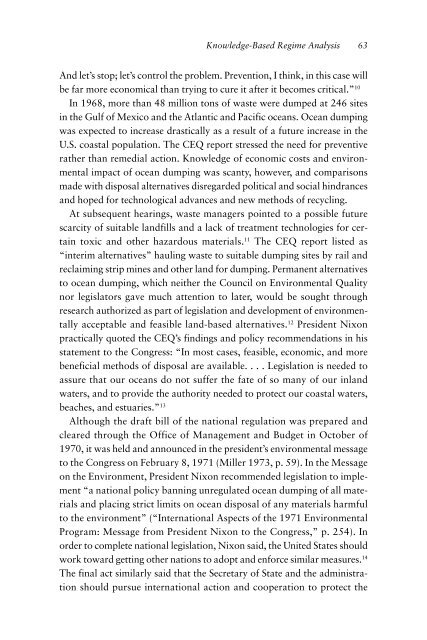Radioactive Waste Disposal at Sea: Public Ideas ... - IMO
Radioactive Waste Disposal at Sea: Public Ideas ... - IMO
Radioactive Waste Disposal at Sea: Public Ideas ... - IMO
You also want an ePaper? Increase the reach of your titles
YUMPU automatically turns print PDFs into web optimized ePapers that Google loves.
Knowledge-Based Regime Analysis 63<br />
And let’s stop; let’s control the problem. Prevention, I think, in this case will<br />
be far more economical than trying to cure it after it becomes critical.” 10<br />
In 1968, more than 48 million tons of waste were dumped <strong>at</strong> 246 sites<br />
in the Gulf of Mexico and the Atlantic and Pacific oceans. Ocean dumping<br />
was expected to increase drastically as a result of a future increase in the<br />
U.S. coastal popul<strong>at</strong>ion. The CEQ report stressed the need for preventive<br />
r<strong>at</strong>her than remedial action. Knowledge of economic costs and environmental<br />
impact of ocean dumping was scanty, however, and comparisons<br />
made with disposal altern<strong>at</strong>ives disregarded political and social hindrances<br />
and hoped for technological advances and new methods of recycling.<br />
At subsequent hearings, waste managers pointed to a possible future<br />
scarcity of suitable landfills and a lack of tre<strong>at</strong>ment technologies for certain<br />
toxic and other hazardous m<strong>at</strong>erials. 11 The CEQ report listed as<br />
“interim altern<strong>at</strong>ives” hauling waste to suitable dumping sites by rail and<br />
reclaiming strip mines and other land for dumping. Permanent altern<strong>at</strong>ives<br />
to ocean dumping, which neither the Council on Environmental Quality<br />
nor legisl<strong>at</strong>ors gave much <strong>at</strong>tention to l<strong>at</strong>er, would be sought through<br />
research authorized as part of legisl<strong>at</strong>ion and development of environmentally<br />
acceptable and feasible land-based altern<strong>at</strong>ives. 12 President Nixon<br />
practically quoted the CEQ’s findings and policy recommend<strong>at</strong>ions in his<br />
st<strong>at</strong>ement to the Congress: “In most cases, feasible, economic, and more<br />
beneficial methods of disposal are available. . . . Legisl<strong>at</strong>ion is needed to<br />
assure th<strong>at</strong> our oceans do not suffer the f<strong>at</strong>e of so many of our inland<br />
w<strong>at</strong>ers, and to provide the authority needed to protect our coastal w<strong>at</strong>ers,<br />
beaches, and estuaries.” 13<br />
Although the draft bill of the n<strong>at</strong>ional regul<strong>at</strong>ion was prepared and<br />
cleared through the Office of Management and Budget in October of<br />
1970, it was held and announced in the president’s environmental message<br />
to the Congress on February 8, 1971 (Miller 1973, p. 59). In the Message<br />
on the Environment, President Nixon recommended legisl<strong>at</strong>ion to implement<br />
“a n<strong>at</strong>ional policy banning unregul<strong>at</strong>ed ocean dumping of all m<strong>at</strong>erials<br />
and placing strict limits on ocean disposal of any m<strong>at</strong>erials harmful<br />
to the environment” (“Intern<strong>at</strong>ional Aspects of the 1971 Environmental<br />
Program: Message from President Nixon to the Congress,” p. 254). In<br />
order to complete n<strong>at</strong>ional legisl<strong>at</strong>ion, Nixon said, the United St<strong>at</strong>es should<br />
work toward getting other n<strong>at</strong>ions to adopt and enforce similar measures. 14<br />
The final act similarly said th<strong>at</strong> the Secretary of St<strong>at</strong>e and the administr<strong>at</strong>ion<br />
should pursue intern<strong>at</strong>ional action and cooper<strong>at</strong>ion to protect the

















